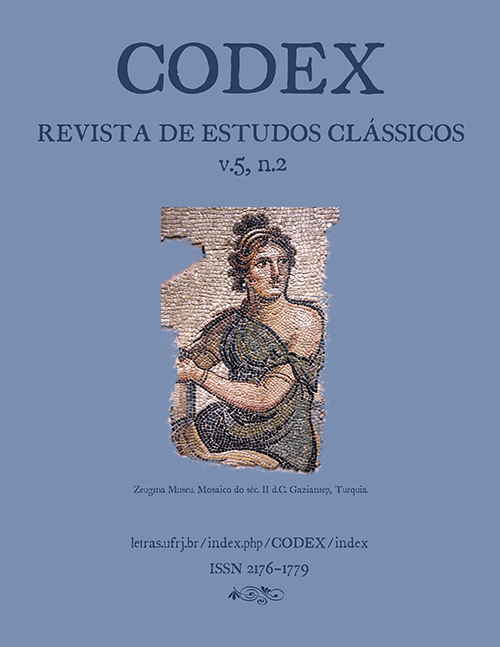The discourse about the Italian lands in Virgil's Georgics
DOI:
https://doi.org/10.25187/codex.v5i2.13467Keywords:
Century of Augustus, Didactic Poetry, Poetic Discourse, DigressionsAbstract
The Georgics (37-30 BC) constitute a poem about rural life and the various agricultural activities: the cultivation of cereals, arboriculture, especially the cultivation of the vine, herd rearing and beekeeping. Each of the four books that compose the work describes a specific activity, through eminently didactic discourse. Throughout the work, however, there are several digressive passages, in which the poet narrates about other themes, usually of a religious, mythological and philosophical nature. One of these passages, known as Laudes Italiae, verses 136 to 176 of the 2nd canto, constitutes a true hymn of praise to the Italian lands. We try to verify the relevance of some of the themes treated in the mentioned verses of the Georgics, considering, mainly, the context of production of the work, and trying to understand its meaning within this didactic poem.Downloads
References
a) Fontes Antigas:
HESÍODO. Os trabalhos e os dias. Introdução, tradução e comentários Mary de Camargo Neves Lafer. São Paulo: Ed. Iluminuras, 1996.
VERGILIUS. Georgiche. Introduzione di Antonio La Penna; traduzione di Luca Canali; note al testo di Riccardo Scarcia. 2ª edizione. Milano: Rizzoli Libri, 1988.
VIRGIL. Georgics. Translation by H. Rushton Fairclough. Cambridge, Massachusetts: Harvard University Press/ London: Willian Heinemann Ltd, 1986.
VIRGILE. Georgiques. Texte établi et traduit par E. de Saint- Denis. Paris: Les Belles Lettres, 1968.
VIRGÍLIO. As Geórgicas. Trad. Antonio Feliciano de Castilho, com anotações de Othoniel Motta. São Paulo: Heros Graphica Editora, 1930.
VIRGÍLIO. As Geórgicas de Virgílio. Versão em prosa dos três primeiros livros e comentários de um agrônomo. Lisboa: Livraria Sá da Costa, 1948.
b) Estudos modernos:
DALZELL, A. The criticism of didactic poetry. Essays on Lucretius, Vergil and Ovid. Toronto; Buffalo; London: University of Toronto Press, 1996.
GALE, M. “Virgil on the nature of things”, In: The Georgics, Lucretius and the didactic tradition. Cambridge: Cambridge University Press, 2000.
JAEGER, W. Paideia -- a formação do homem grego. Trad. Artur M. Parreira. São Paulo: Martins Fontes, 2003.
LAFER, Mary de Camargo Neves. “Introdução”, In: HESÍODO. Os trabalhos e os dias. Introdução, tradução e comentários Mary de Camargo Neves Lafer. São Paulo: Iluminuras, 1996.
LA PENNA, A. “Introduzione”, In: VERGILIUS. Georgiche. Milano: Biblioteca Universale Rizzoli, 1988.
LAUSBERG, H. Elementos de retórica literária. Lisboa: Fundação Calouste Gulbenkian, 1965.
___________. Handbook of literary rhetoric: a foundation for literary study. Transl. by Matthew T. Bliss. Leiden; Boston; K¶ln; Brill, 1998.
MAYER, Ruy. “Introdução”, In: VIRGÍLIO. As Geórgicas de Virgílio. Versão em prosa dos três primeiros livros e comentários de um agrônomo. Lisboa: Livraria Sá da Costa, 1948.
MOISÉS, Massaud. Dicionário de termos literários. 12. ed. São Paulo: Cultrix, 2003.
NOVAK, Maria da Gloria. Poesia lírica latina. Campinas: Martins Fontes, 2003.
OTIS, Brooks. Virgil: a study in civilized poetry. Oxford: Oxford University Press, 1963.
PEREIRA, M. H R. Estudos de história da cultura clássica II: a cultura romana. Lisboa, Calouste Gulbenkian, 1984.
SANTOS, Elaine C. Prado dos. O IV canto das Geórgicas. São Paulo: Scortecci, 2007.
________. O IV canto no contexto das Geórgicas, tradução e notas. Dissertação de Mestrado. São Paulo: USP, 1995.
SOUZA, Jovelina M. R. de. “A poesia grega como paidéia”, In: Princípios. Natal, v. 14, n. 21, Jan / Jun, 2007; p. 195 -- 213.
TOOHEY, P. Epic lessons -- An introduction to Ancient didatic poetry. London; New York: Routledge, 2010.
TREVIZAM, Matheus. Linguagem e interpretação na literatura agrária latina. Tese de Doutoramento. Campinas: UNICAMP, 2006.
_________. Poesia didática: Virgílio, Ovídio e Lucrécio. Campinas: Editora da UNICAMP, 2014.
VOLK, Katharina. Oxford readings in Classical studies: Vergil´s Georgics. Oxford: Oxford University Press, 2008.
________. The poetics of Latin didatic: Lucretius, Vergil, Ovid, Manilius. Oxford: Oxford University Press, 2008.
WEBER, Max. Historia agraria romana. Traduccíon V. A. Gonzalez. Madrid: Akal Editor, 1982.
WEEDA, Leendert. Vergil's Political Commentary in the Eclogues, Georgics and Aeneid. Berlin: De Gruyter Open Ltd, 2015.
Downloads
Published
How to Cite
Issue
Section
License
This work is licensed under a Creative Commons Attribution-NonCommercial 4.0 International License.










